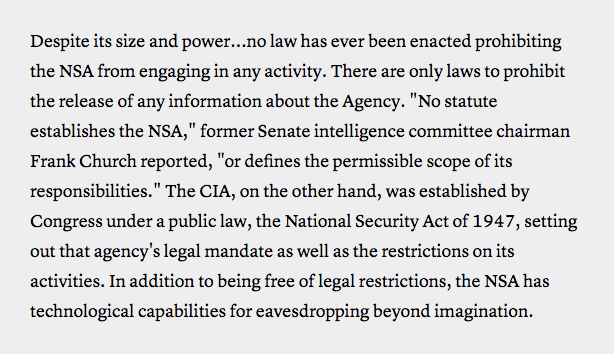
This is my own article, originally published via Disobedient Media in January 2018. This article is my own own intellectual property.
Disobedient Media previously reported on the Senate's passage of legislation that reauthorized a section of controversial FISA law. Since publishing that article, President Trump tweeted that he had signed off on the legislation, despite widespread calls to veto the bill. FISA laws were initially implemented in 2008 under President Obama, and were set to expire last week.
The Verge reported that Section 702 of the FISA Amendments Act provides the director of national intelligence and attorney general with the authority to surveil anyone outside of the country, and remains controversial. The Verge added that, while it is designed to target and surveil non-US citizens, privacy advocates say that US citizens can get caught up as well. "This new bill includes some new provisions: authorities can now access communications that simply mention the target, even if they are not the recipient of said message."
Additional press reports cited The American Civil Liberties Union, who called on Trump to veto the FISA section 702 reauthorization bill. The ACLU wrote: "Trump's tweet saying the law he signed was different from the one "so wrongly abused" before was not accurate." The ACLU tweeted that the bill Trump signed "allows the government to violate Americans' rights and makes the law worse in several ways."
Media coverage of the reauthorization of FISA 702 has been markedly tepid in recent weeks, often echoing the sentiments of establishment think tanks. CNN's coverage on the issue was stridently pro-NSA, titled: "Senate must pass FISA Section 702 to protect Americans." CNN's article remarkably paralleled the Heritage Foundation, who wrote: "Renewal of FISA’s Section 702: Why America Needs the Provision." That a supposedly left-leaning press outlet and a conservative think-tank are echoing the same chorus line is particularly noteworthy.
This consensus between legacy press outlets and a right-wing think tank represents an example of what Disobedient Media has previously characterized as an immaterial division between "left" and "right" wing factions within the establishment. The real unanimity between these apparently opposing sides is revealed by their agreement on issues like FISA.
Meanwhile, Fox News related that the FISA Amendments Act allows the government to collect the data from American firms, such as Google or Microsoft, according to the nonprofit Center for Democracy & Technology. Additionally, Disobedient Media previously cited JustSecurity's observation that The NSA’s own slides describe targeting individuals in Latin America based on issues like “energy” and “political affairs.” This is important because it belies platitudes provided by Paul Ryan, CNN, The Heritage Foundation and their ilk aimed at excusing illegal surveillance in the name of national security and fighting terrorism.
CNN also reported Paul Ryan's statement on the bill, which emphasized its use being limited to 'terrorists' in foreign countries: "This is about foreign terrorists on foreign soil. That's what this is about, so let's clear up some of the confusion here." Despite Ryan's attempt at "clarifying confusion," his statement flies in the face of Snowden documents published in 2013 that showed the NSA also spied illegally on Americans.
The revelations from the Snowden files are important when critically appraising claims that such powers will only be used on 'terrorists' outside the U.S. Pro Publica wrote regarding the Snowden files' revelation that under the Obama Administration, the NSA was given massive powers of warrantless surveillance of American citizens' internet traffic. To pretend ignorance regarding the reality behind the renewal of FISA 702 in the face of these facts is absurd.
That the NSA targets political dissidents and American citizens provides legitimate cause for concern over the passage of FISA reauthorization. The issue is compounded in light of recent DecipherYou findings showing that the NSA also actively attempts to avoid government oversight.
On the same day that Trump tweeted that he'd signed the FISA section 702 reauthorization, Suzie Dawson and this author analyzed a never-before scrutinized Snowden file that showed the NSA endorsing an employee who had interfaced with Congress, and who advised the NSA move to avoid legislative oversight. The file in question was titled: "Do We Over-Classify? Are We Sharing Enough Information?"
Suzie Dawson, a journalist, activist, and current leader of the Internet Party of New Zealand, noted that the unnamed author was effectively telling the entire NSA staff that: "The Senate Intelligence Committee should not be allowed to set the terms for reform of the NSA." Such a revelation is both disturbing and relevant in regards to the current issues surrounding FISA 702.
The file contains an incredible statement made by the unnamed individual, whose role was at one time to interface between the agency and Congress. They wrote: "...My worry is that a consensus is building within Congress that they need to take action to deal with this problem. Trust me, we don't want that. We need to address this issue so that the solution is one of our creation and not one that is imposed on us from the outside."
During the DecipherYou stream, Dawson commented on the contents of the document: "They [Congress] are mandated by law to set the terms under which the NSA operate. The NSA does not have the mandate to set the terms under which the NSA operates. But this entire document is saying that the NSA needs to set their own rules and boundaries."
Dawson continued: "Oversight is there because the NSA does not work for the NSA, the NSA works for the public, the Congressional overseers are the elected representatives of the public. It is their job to set the borders and boundaries of what NSA can do, what it's mission is, why it does that mission, and how it can do that mission."
The author of the file discusses their experience as an interface between Congress and the NSA as well as having served as "the budget monitor for all of the NSA's programs," as part of the Senate Select Committee on Intelligence. They recounted participating in the NSA's 'Legislative Affairs Office,' which is tasked with interfacing with the Congress, and controls the communications with legislators, determining which information lawmakers receive.
Dawson explained: "If you are in the NSA, you are not allowed to talk to Congress without going through this office... their job is to whitewash and micromanage information that reaches oversight committees. So this person was a part of that office, and has come out of that office, and is 100% resistant to oversight." She assed that the SID Today document had gone out to the entire NSA workforce, which indicates that the NSA endorsed their sentiments.
The document states: "My second "first job" at NSA was on the Senate team (Duh!) in the Legislative Affairs Office (LAO). That job afforded me the opportunity to utilize the experience I had gained working on Capitol Hill to help the Agency's senior leaders to develop a successful strategy for dealing with the Congress. That was a particularly challenging and rewarding time in my career."
The NSA's disturbing level of independence from legislative oversight was also discussed by The Atlantic in 2013: "...In a representative democracy with a bicameral legislature, Congress was surprised to find that a federal intelligence agency they'd scarcely heard of was bigger and more powerful than one that they'd created. Even after post-Vietnam cutbacks, the NSA counted 68,203 staffers in 1978, making it bigger than all other intelligence agencies combined. And it was unlike other agencies."

Image via The Atlantic
As this author discussed with Dawson during the DecipherYou episode relating to this finding, the document completely undercuts any pretense that the NSA needs powers including FISA to protect the American people or the rest of the world, for that matter.
Primary source information, of which the document is a particularly important example, adds to the growing number of important findings stemming from DecipherYou. The files shed light on current issues including the passage legislation renewing FISA section 702, and the implications stemming from the overreach of the NSA as a result of such legislation. Disobedient Media will continue to report on important discoveries from never-before-scrutinized Snowden files as they emerge.

there is no end to this
Unfortunately it doesn't look like it.
It was very sad that the House Intelligence Committee did not issue their FISA abuse memo until 702 was renewed.
Agreed.
Great article @elizbethleavos.
Thank you!
You just earned the can of worms Award!
Impressive amount of work in opening up such a big can of worms!
Haha thank you. I think. :)
The two of you do a great job.
Can't wait to see what you find in the next can you pull open. :-)
It's sad what you uncover, i try to see some brightness in the darkness of it all.
Keep up the good work ladies!
your post is very important post of the world.But very sad news.Thank you so much.
Thank you!
Curated for #informationwar (by @openparadigm)
Relevance:FISA
Thank you so much!
Thanks for sharing your valuable time and information with uss.......
...the post is really great..although it took me atleast 25 minutes to read but realizationatters at the end...thankyou again
Thank you!
Is it appropriate to say they've "gone rogue" if the agency is actually doing exactly what it was truly intended to since it's inception? I like idea of using the descriptor "rogue" but it feels a bit disingenuous when unconstitutional spying and dodging oversight was always on the agenda. "Rogue" implies they're doing something they're not supposed to, but the crimes they commit was always their raison d'etre.